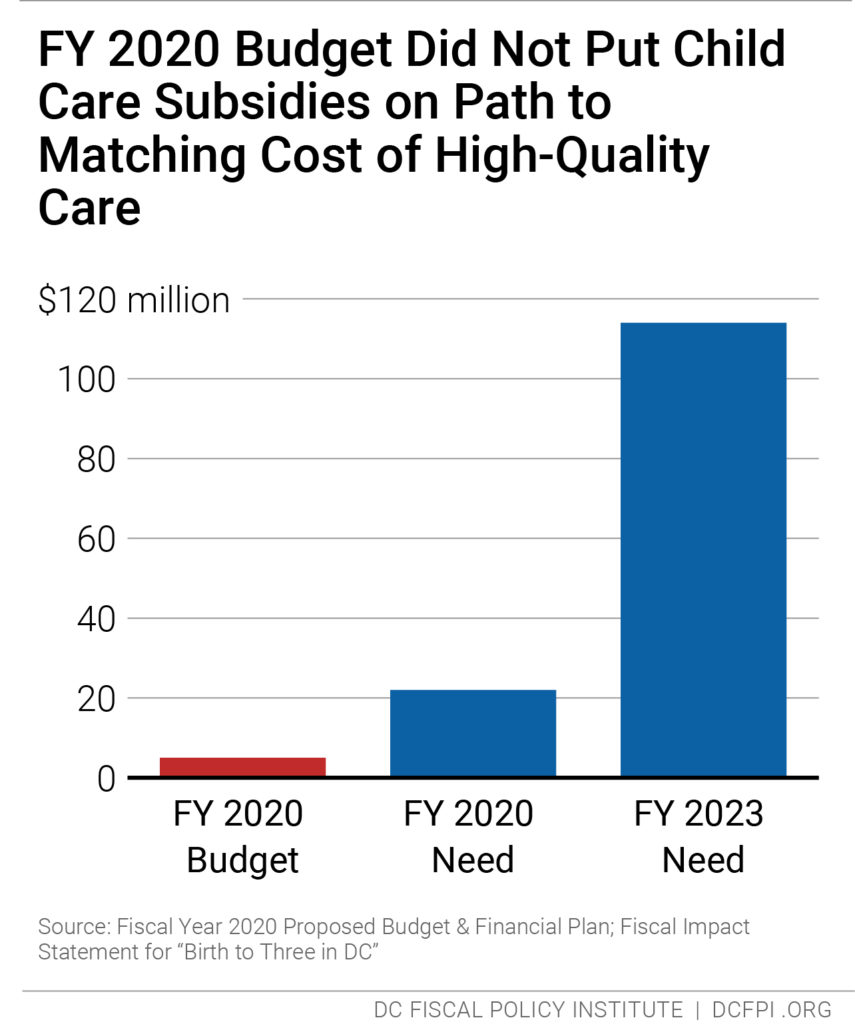In the last fiscal year (FY), the Mayor and DC Council made notable investments in the Birth-to-Three Act to support early childhood programs for the District’s thousands of infants and toddlers. Policymakers can and should build on this success in the FY 2021 budget to ensure that all of DC’s children have a strong start and that early childhood educators are compensated fairly.
Improve the Quality of Subsidized Childcare Programs
Every family in DC should have the resources they need to give their child a strong, healthy start. High quality early education is an essential building block of education equity, yet for most working families it is out of reach. The District’s Child Care Subsidy program helps lower-income families—many of whom are families of color—afford high-quality early learning opportunities for their child.

The FY 2020 budget made great strides toward strengthening the subsidy program by providing an additional $9.3 million for higher reimbursement rates for providers, with the goal of covering a greater share of the cost of high-quality care. Yet, this increase in reimbursement rates falls short of what’s needed to implement the Birth-to-Three Act and provide an enriching, high-quality early childhood learning environment to DC’s youngest learners (Figure 1).
Each year, providers are met with increasing expenses, such as licensing fees, rent and utilities, food, and classroom materials, making it extremely expensive to operate high-quality programs. These costs leave many providers struggling to keep the lights on, often leading them to make the tough decision to go out of business—contributing to a childcare shortage.
Ensuring that reimbursement rates cover the full cost of providing childcare is a matter of equity. Lower-income Black families participating in the subsidy program are hit the hardest when providers accepting subsidies are forced to close due to growing costs—that’s because centers serving these families rely heavily on the District’s subsidized program. Nearly all licensed infant and toddler slots in Wards 7 and 8 are used by children receiving subsidies, and over half of the children in licensed childcare in Wards 1, 4, and 5 are receiving subsidies.
The District should invest $20 million in FY 2021 to increase funding for the childcare subsidy program to ensure reimbursement rates cover the full cost of high-quality care and education.
Pay Early Childhood Educators a Fair Wage
Many early childhood educators in DC—most of whom are women of color and over half of whom are Black—don’t earn salaries that reflect the importance and value of the highly skilled work they perform. Earnings for early childhood educators place them among the lowest-paying occupations in the District. In 2018, childcare educators had median annual earnings of about $30,900—far less than preschool and kindergarten teachers ($38,210 and $54,510, respectively) and less than what it costs to get by.
Low earnings have serious consequences, including high rates of poverty, persistent levels of stress, and harmful levels of early educator turnover—in the District, early childhood educators leave the profession within 8 months to two years. High rates of turnover can disrupt the relationship between early educators and children, compromising the consistency and overall quality of infants and toddlers’ learning experience. For educators that do stay, stress resulting from economic insecurity can potentially make it difficult for educators to provide the attentive and supportive care young children need.
The District should invest $20 million to raise reimbursement rates to ensure early educator pay is in line with their peers’ earnings and matches the value of the work they perform, which is critical for retaining a workforce that is equipped to provide high-quality care.

Make New Investments in Early Childhood Mental Health Services
The Birth-to-Three Act calls for increased investments in the Department of Behavioral Health’s Healthy Futures program in which child mental health clinicians provide on-site consultations to build educators’ capacity to reduce challenging behaviors, promote positive social emotional development, and support families.
The FY 2020 budget provided $1.5 million, matching the estimate of what’s needed to jumpstart the expansion of the program under the Birth to Three Act.
The District is right in prioritizing the mental and social-emotional health of more infants and toddlers. Positive social-emotional development allows children to play and get along with adults and their classmates and manage stress and overcome challenges—skills that promote school readiness and overall success in life. On the other hand, poorly developed social-emotional skills and untreated mental health disorders can lead children to display disruptive behaviors, potentially resulting in higher rates of teacher turnover and expulsion of children from childcare centers.
Early childhood educators can also benefit from having access to mental health consultants. Consultants can help educators navigate the mental health challenges they face as a result of rewarding, yet high-stress, underpaid work. Educators who are less stressed and feel more empowered to do their job every day can lead to better overall outcomes such as improved classroom climate, enhanced classroom management skills, and reduced child behavioral problems.
The District should invest at least $1.5 million to expand Healthy Futures in up to 60 new child development centers, improving the mental health and wellbeing of thousands of infants and toddlers, families, and educators.
